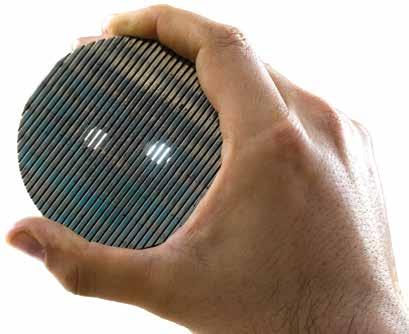
4 minute read
ICY ORIGINS OF LIFE
A new study led by SwRI’s Dr. Danna Qasim posits that interstellar cloud conditions may have played a significant role in the origin of key building blocks of life in the solar system.

“Carbonaceous chondrites, some of the oldest objects in the universe, are meteorites that are thought to have contributed to the origins of life,” Qasim said. “They contain several different molecules and organic substances, including amines and amino acids, which were critical building blocks for life on Earth. These substances are necessary to create proteins and muscle tissue.”
Most meteorites are fragments of asteroids that broke apart long ago in the asteroid belt, located between Mars and Jupiter. These rocky or metallic meteors orbit the Sun — sometimes for millions of years — before transiting the Earth’s atmosphere to impact its surface.
Scientists wonder how amino acids were assimilated into carbonaceous chondrites in the first place. Because most meteorites come from asteroids, scientists have attempted to reproduce amino acids by simulating asteroid conditions in a laboratory setting, a process called “aqueous alteration,” with limited success.
“However, the asteroid matter originated in the parental interstellar molecular cloud, which was rich in organics,” Qasim said. “The molecular cloud could have provided amino acids in parent asteroids, which passed them on to meteorites.”
Qasim simulated the creation of amines and amino acids in the laboratory to characterize the environmental conditions favoring formation.
“I created ices common in the cloud and irradiated them to simulate the impact of cosmic rays,” explained Qasim, who conducted the experiment while working at NASA’s Goddard Space Flight Center in Greenbelt, Maryland, between 2020 and 2022. “This caused the molecules to break up and recombine into larger molecules, which ultimately created an organic residue.”
Qasim then reprocessed the residue by recreating asteroid conditions through aqueous alteration and studied the substance, looking for amines and amino acids.
“No matter what kind of asteroid processing we did, the diversity of amines and amino acids from the interstellar ice experiments remained constant,” she said. “That tells us that interstellar cloud conditions are quite resilient to asteroid processing. These conditions could have influenced the distribution of amino acids we find in meteorites.”
However, the individual abundances of amino acids doubled, suggesting the asteroid processing influences the amount of amino acids present.
“Essentially we have to consider both the interstellar cloud conditions and processing by the asteroid to best interpret the distribution,” she said.
Asteroid samples from missions such as OSIRIS-REx and Hayabusa2 will help scientists better understand the role asteroid processes played vs. those the instellar cloud played in distributing the building blocks of life.
Visit https://www.swri.org/podcast/ep52 to hear Qasim discuss her research on the Technology Today Podcast.
Upcoming
WEBINARS, WORKSHOPS and TRAINING COURSES HOSTED by SwRI:
Introduction to Propulsion Simulation Using NPSS Short Course, May 2, 2023. In-person training.
Preliminary Aerodynamic Design Radial Expanders for Beginners, May 10, 2023. Free webinar.
ISO 9001 Internal Auditor, May 15-16, 2023. Two-day in-person training.
Introduction to Microencapsulation, June 12-13, 2023. Two-day in-person workshop.
Tolerance Stack Analysis Webinar, June 26, 2023. Virtual training.
International Human Performance Summit, July 20, 2023.
Penetration Mechanics Short Course, September 11, 2023. In-person training.
CONFERENCES/MEETINGS:
IEEE Radar Conference, San Antonio, May 1, 2023. Booth No. 207.
Offshore Technology Conference, Houston, May 1, 2023. Booth No. 2739.
Athlete Engineering Summit, Starkville, Mississippi, May 10, 2023.
Automate, Detroit, May 22, 2023. Booth No. 5913.
EPRI Nondestructive Evaluation Technology Week, New Orleans. June 19.
National Space & Missile Materials Symposium and CRASTE Joint Symposia, Tucson, Arizona, June 26, 2023. Booth No. 207.
ASME Turbo Expo, Boston, June 26, 2023. Booth No. 424.
Modern Day Marine, Washington, June 27, 2023. Booth No. 749.
Hydrogen Technology North America, Houston, June 28, 2023. Booth No. 1180.
Institute of Food Technologists Conference, Chicago, July 17, 2023. Booth No. S3237.
Controlled Release Society Annual Meeting, Las Vegas, July 24, 2023. Booth No. 210.
Life Cycle Industry Days & Wright Dialogue with Industry, Dayton, Ohio, July 31, 2023, Booth No. 410.
Small Satellite Conference, Logan, Utah, August 5, 2023, Booth No. 50.
Ground Vehicle Systems Engineering & Technology Symposium, Detroit, August 15, 2023. Booth No. 227 & 229
45 presentations given in
4 countries
FALL 2022
SPRING 2023
9 states &10 virtual conferences by the numbers publications
19 papers published in
15
29 patents awarded
Manager Jody Little received the Award for Meritorious Civilian Service from the Department of the U.S. Air Force in December 2022. He was given the award in recognition for a temporary two-year assignment serving as executive program manager of the Department of Defense Joint Base San Antonio 5G NextGen Program and Program Management Office.
Associate General Counsel Bill Mason (General Counsel’s Office) was recently elected a Fellow of the Texas Bar Association. Fellowship is limited to 1/3 of 1 percent of licensed attorneys in the state of Texas.
Executive Director of Communications
Tim Martin, Ph.D.
Editor
Deb Schmid
Assistant Editor
An SwRI research team won SAE International’s prestigious John Johnson Best Paper Award for Outstanding Research in Diesel Engines. A committee of industry professionals selected “CARB Low NOx Stage 3 Program – Final Results & Summary” from hundreds of diesel engine articles and papers published in SAE International’s journals and conference proceedings. The paper, the latest of several focused on ultra-low NOx emissions initiatives, was authored by Institute Engineer Christopher Sharp, Senior Research Engineer Bryan Zavala, Senior Research Engineer Sandesh Rao and Principal Engineer Gary Neely
The San Antonio Business Journal selected three SwRI staff members to receive 2023 40 Under 40 Awards, which recognize professionals under 40 years old who have demonstrated excellence in business, leadership and community involvement. Dr. Kelly Miller is a planetary scientist who has served in key roles in a variety of NASA missions, including the upcoming mission to visit Jupiter’s moon Europa. She helped develop MASPEX, a groundbreaking new instrument to sample Europa’s oceans and atmosphere. Meera Towler, a senior research engineer in SwRI’s Intelligent Systems Division, specializes in complex robotic and autonomous systems, including an advanced mobility system designed to operate in confined spaces. She has created software for robots designed to operate in outer space. Angel Wileman manages SwRI’s Thermofluids Section, helping lead an initiative to advance hydrogen fuel projects to transition away from greenhouse gases. She is active in outreach work promoting STEM careers to young women and girls.
Lisa Peña
Contributors
Jesús Chávez
Robert Crowe
Joanna Quintanilla
Maria Stothoff
Tracey Whelan
Design
Jessica Vidal
Illustration
Todd Pruetz
Photography
Ian McKinney
Bryan Winter
Circulation
Cecilia Novak
Address correspondence to the Editor, Communications Department, Southwest Research Institute, 6220 Culebra Road San Antonio, Texas 78238-5166, or e-mail dschmid@swri.org
To be placed on the mailing list or to make address changes, call 210.522.2257 or visit update.swri.org swri.org
©2023 Southwest Research Institute. All rights reserved. Technology Today, Southwest Research Institute, and SwRI are registered marks in the U.S. Patent and Trademark Office.








